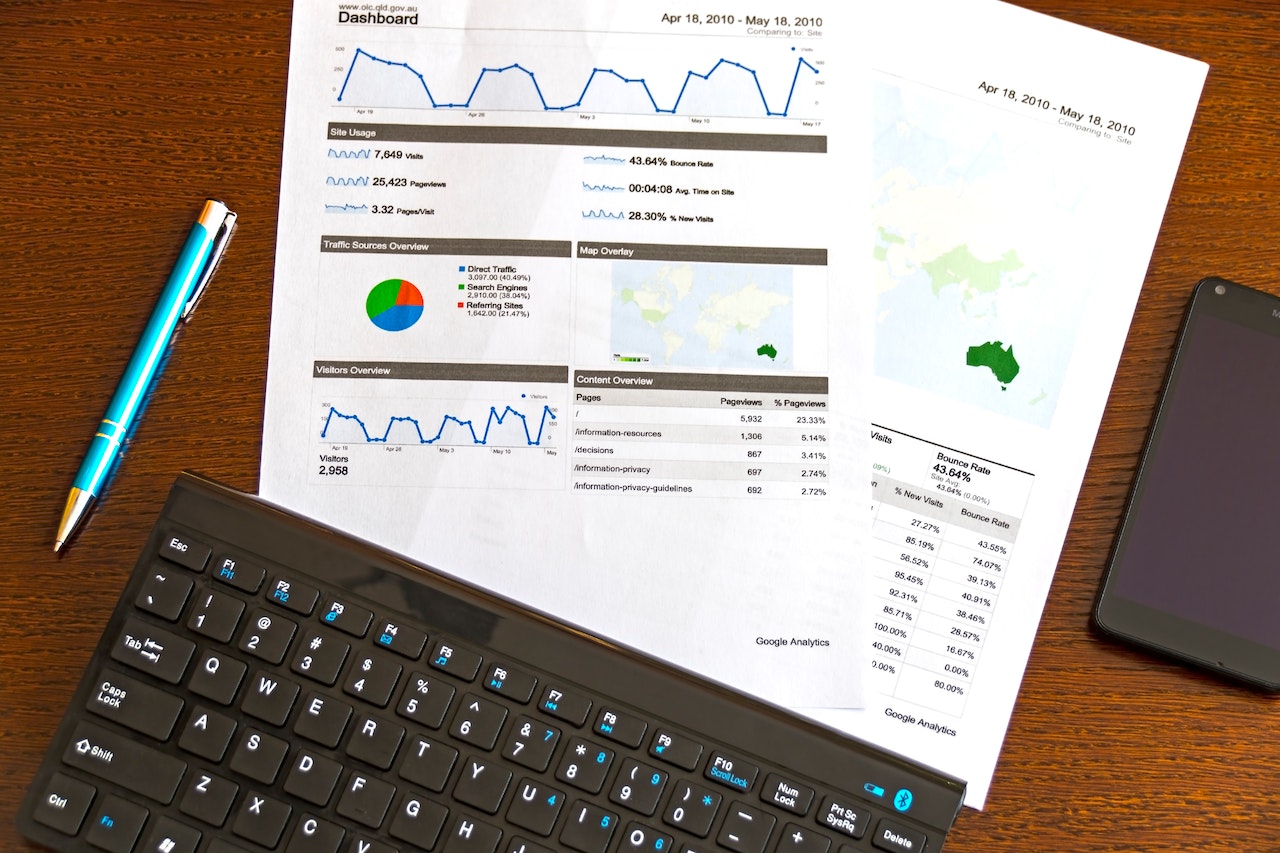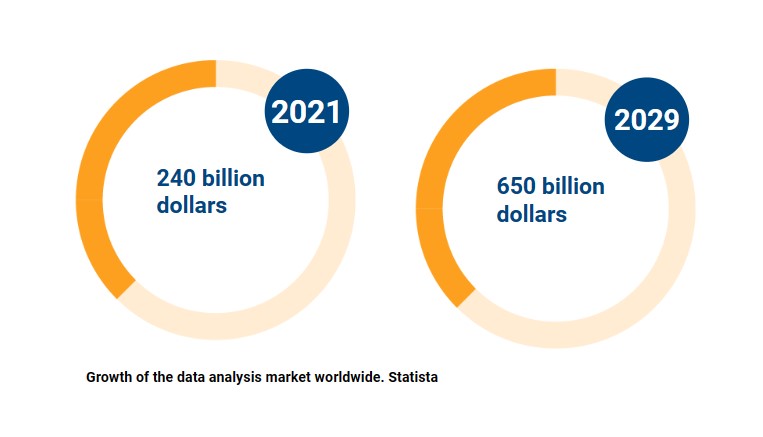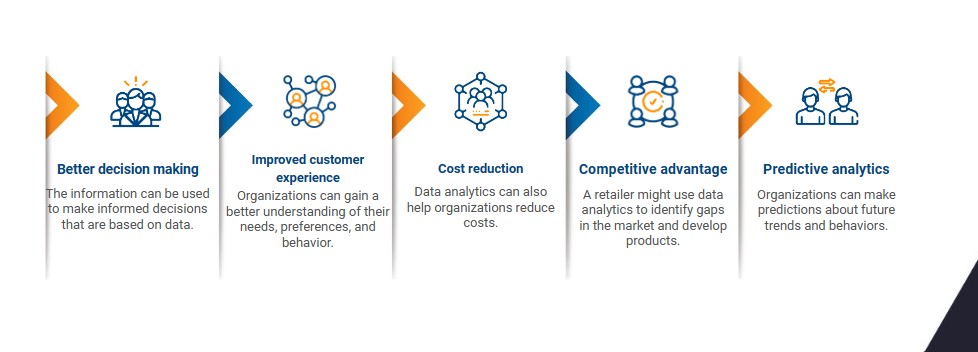
Companies all over the world are continuously looking for strategies and technical solutions to help them improve sales, acquire new consumers, and keep present customers trusting them. Data analytics is one of the most recent corporate success trends.
Data analytics has been a buzzword in the business world for quite some time. With the rise of big data and technological advances, organizations are increasingly turning to data analytics to gain insight into their operations, customers, and markets. In this blog post, we'll take a look at some of the opportunities data analytics presents for businesses.
What is Data Analytics?
At Investopedia, they define data analytics as “the science of analyzing raw data to draw conclusions about that information. Many of the data analysis techniques and processes have been automated into mechanical processes and algorithms that work on raw data for human consumption.”
Global data analytics market growth
Like any trend in technology, data analytics has grown exponentially in its use worldwide, achieving in 2022 to be valued at more than 270 billion dollars. According to a study carried out by the specialized portal Statista, "The global big data analytics market was valued at more than 240 billion US dollars in 2021. The market is expected to experience significant growth in the coming years, with a projected market value of more than $650 billion by 2029.”

This is nothing more than a clear sample of the effectiveness of data analysis for companies that have decided to use it. They have seen positive results in a short time, motivating the competition to apply this technique equally and thus boosting the profits and value it has for different industries worldwide.
Business opportunities with Data Analytics
Better decision making
One of the biggest benefits of data analysis is that it enables better decision making. Through data analysis, organizations can identify patterns, trends, and insights that are otherwise difficult to discern. This information can be used to make informed decisions that are based on data rather than assumptions or guesswork. With the help of data analysis, companies can make better decisions on everything from marketing campaigns to product development.
Improved customer experience
Another opportunity with data analytics is to improve the customer experience. By analyzing customer data, organizations can gain a better understanding of their needs, preferences, and behavior. This information may be used to customize products and services to meet your specific needs. For example, a retailer might use data analytics to identify the products that are most popular with their customers and ensure they are always available.
Cost reduction
Data analytics can also help organizations reduce costs. By analyzing data about operations and processes, companies can identify areas where efficiencies can be achieved. For example, a manufacturer might use data analytics to identify inefficiencies in its supply chain, such as delivery delays or excess inventory, and take steps to address these issues.

Competitive advantage
Data analysis can also provide a competitive advantage. By analyzing competitor data, companies can gain insight into their strengths and weaknesses. This information can be used to develop strategies to outperform them in the market. For example, a retailer might use data analytics to identify gaps in the market and develop products to fill those gaps before its competitors.
Predictive analytics
Finally, data analytics can be used for predictive analytics. By analyzing historical data, organizations can make predictions about future trends and behavior. This information can be used to make informed decisions about everything from inventory management to marketing campaigns. For example, a retailer could use predictive analytics to forecast demand for a particular product and ensure they have enough stock to meet that demand.
In conclusion, data analysis presents numerous opportunities for companies. From better decision making to improved customer experience, cost reduction and competitive advantage, data analytics can help organizations gain insight into their operations, customers and markets. As the importance of data analytics continues to grow, it is essential that companies invest in the technology and talent needed to effectively take advantage of these opportunities.

How the Data Analytics process works in Rootstack
Data analytics is the process of examining and analyzing large data sets to discover meaningful patterns, insights, and trends. It involves applying various techniques, such as statistical analysis, data mining, machine learning, and visualization, to transform raw data into valuable information that can support decision-making and drive business strategies.
Data analytics aims to extract knowledge and understanding from data by organizing, cleaning, and interpreting it. The process we work at Rootstack to do data analysis usually involves the following steps:
- Data Collection: Collection of relevant data from various sources, such as databases, websites, sensors, or social media platforms.
- Data cleaning and preprocessing: This step involves removing inconsistencies, errors, and irrelevant information from the collected data. It may also include transforming the data into a format suitable for analysis.
- Data Exploration and Visualization: Analyze data using statistical techniques and visualize it through tables, graphs, or interactive dashboards to identify patterns, correlations, and outliers.
- Data modeling and analysis: Application of statistical models, machine learning algorithms, or predictive analytics techniques to discover information, make predictions, or solve specific problems.
- Interpretation and Communication: Interpret the results of the analysis and communicate the findings to interested parties, such as business executives, managers, or decision makers.
Data analytics has applications in a number of fields, including business, finance, healthcare, marketing, sports, and the social sciences. It enables organizations to gain valuable insight into customer behavior, optimize operations, improve decision-making processes, detect anomalies or fraud, and improve overall performance.
With this solution, companies will be able to access important information in real time. Data Analytics solutions storage, traceability and data recovery are of great importance as they allow predictive and prescriptive analysis. You will also be able to perform data validations faster and it will be possible to generate more accurately traceable patterns.
We recommend you on video


